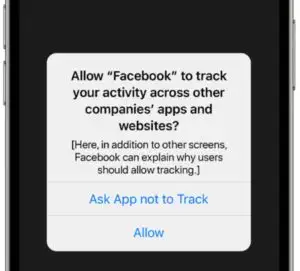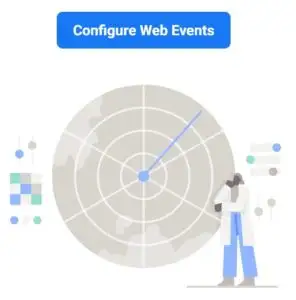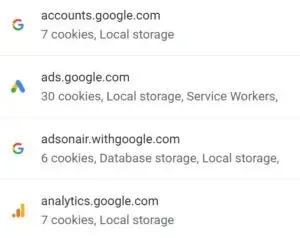Google and Apple are rolling out changes to give consumers more control over how their online activities and private information can be tracked for marketing. As the two dominant operating systems release new features that allow individuals to block websites and apps from harvesting their data, organisations need to identify ways to respect customer privacy, while still marketing their products and services effectively.
At the core of these transformative changes lie two technologies that face obsolescence: cookies and IDFA / Advertising IDs.
Tracking cookies
Cookies are text files with a small amount of data used by websites to remember information about visitors. They are used in the first-party context to remember an individual’s logged in state, or preferences on a website. Cookies can also be used to track information about other websites an individual visited.
Identifier for Advertisers & Android Advertising ID
Similar to the function of cookies, IDFA (Identifier for Advertisers) and AAID (Google Advertising ID for Android) are used by Apple and Google respectively and developers on their operating systems to track the activities of mobile device users. Like cookies, the IDFA and AAID can be used to track in-app activity as well as activity on third-party websites and apps.
What’s changing with cookie tracking?
Cookies aren’t going away! At present, there is no viable alternative for the cookie. First-party cookies will still be used to track customer preferences and status. However, Firefox, Safari, and Chrome have already started offering people the option to block third-party cookies. While these settings were historically hidden, and unused by the vast majority of people, they will soon be brought to the front. By 2023, third-party cookies will be blocked by default for nearly 90% of Internet users.
Update: Google has recently announced that they will delay the roll-out of changes to third-party cookie handling by a year, to give themselves more time to meet UK regulatory requirements.
How is IDFA changing?

iOS 15 will take this even further. Not only will the upcoming version of Apple’s operating system provide users a “privacy dashboard”, which will detail all app access and tracking requests, but it will also block developers from accessing IP addresses on Safari and Mail, which means developers won’t be able to bypass app tracking opt-out by tracking IP addresses, and marketeers will no longer be able to track email open rates for recipients via the IP address. Moreover, a “hide my email” feature will allow Apple customers to obscure their email addresses from marketing.
Is AAID changing too?

Android 12 – the latest version of Google’s mobile operating system – is already available in beta and will be launched later this year. A new “Privacy Dashboard” allows users to see which apps accessed certain permissions in the past 24 hours, and revoke those permissions.
Most important for advertisers, though, is the upcoming change to Advertising IDs. Starting in late 2021, when a user opts out of interest-based advertising or ads personalization, the advertising identifier will not be available. Apps will receive a string of zeros in place of the identifier. In the past, when a user opted out, Google simply advised the app developers not to track the user, but this wasn’t enforced. Now, when a user opts out, the app will completely stop getting any identifiable information.
The impact for marketing
When businesses are unable to track activity on their websites and apps, their marketing teams lose valuable insights that all modern performance marketeers rely on – metrics such as conversion rates, return on ad spend, and customer value.
Marketing features that rely on this data includes:
- Conversion tracking
- Campaign optimisation
- Remarketing
- Lookalike audiences
- Attribution modelling
The first two are perhaps the most important. When advertising channels like Facebook and Google Ads 360 can no longer track conversions, they also lose the ability to optimise ad creative, audience targeting, and keyword targeting to maximise conversions. Facebook estimates that advertisers who lose the ability to track conversions and have to return to link click optimisation see over 150% average increase in cost-per-action (CPA)!
How to minimise the damage
Unlike GDPR and cookie notices, these new privacy changes have a direct impact on performance marketing. Early stats show that the vast majority of iOS 14.5 users are opting out of tracking. If the prompt on Chrome is as visible, or worse, if it’s set to default and then hidden deep in the settings, most people are likely to block third-party cookies on the most popular browser too.
Some fallout is unavoidable. The idea for marketeers is to incorporate these privacy measure and work with them to minimise the impact on performance.
Server side tracking
For advertisers who want full control over tracking, data collection, and governance, server side tracking is the best option. You can run a fully functional digital analytics and marketing setup without loading any third-party code or relying on cookies in the user’s browser or device.
Server-side tracking bypasses the obstacles to tracking with cookies or IDFA and AAID, by allowing your server to communicate directly with the ad platform every time a user interacts with your website. Read our article explaining server-side tracking in more detail, or look at this simple gif explaining the concept visually:
Technically-inclined marketeers can code a server-based integration with our help, if needed. A better alternative for those less keen on changing server-side code is to use a server-based tagging solution, such as Google Tag Manager Server-Side.
Facebook’s iOS 14 settings

- Verify your domain in Facebook Business Manager
- Prioritise up to eight events to track in Events Manager
- Check that none of your ad campaigns are optimised for events that aren’t prioritised
- Account for smaller audiences and plan to supplement this
- Update to the latest version of the Facebook SDK
- Set up your events schema in Events Manager
- Understand measurement and reporting changes and adapt marketing and attribution plans
Read our summary of steps you should take to ensure your campaigns aren’t underperforming or even stopped, and verify you’ve completed all the points in this iOS 14.5 preparation checklist.
Acquire more first-party data

First-party data is any information you collect directly from your customers and website visitors. This may be via first-party cookies you place on their browsers, purchases they make on your physical or e-commerce store, or forms they submit to access information on your website.
In a cookieless world, you can still leverage your first-party data to deliver targeted, personalised customer experiences. This data is GDPR-compliant, and it doesn’t rely on opt-in from platforms you cannot control. You can use your first-party data to build email marketing lists as well as custom audiences on Facebook, Google, Twitter, and LinkedIn.
Need help future-proofing your marketing?
Get in touch to arrange a consultation
About the Author
Farhad is the Group CEO of AccuraCast. With over 20 years of experience in digital, Farhad is one of the leading technical marketing experts in the world. His specialities include digital strategy, international business, product marketing, measurement, marketing with data, technical SEO, and growth analytics.













